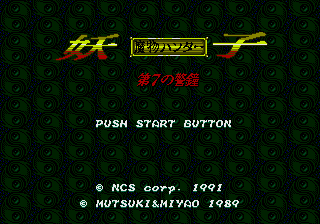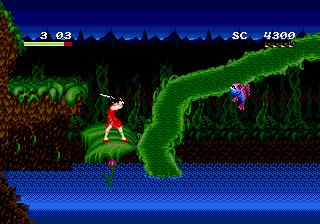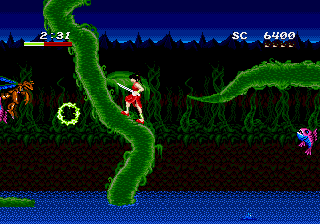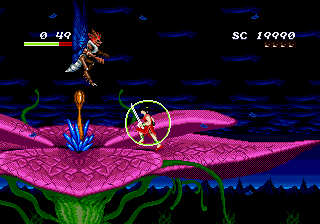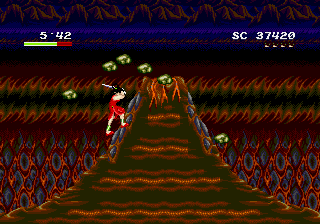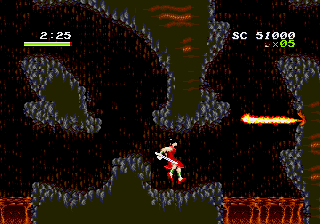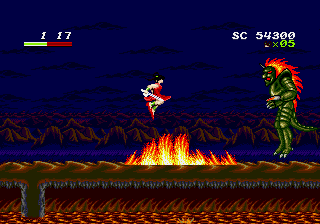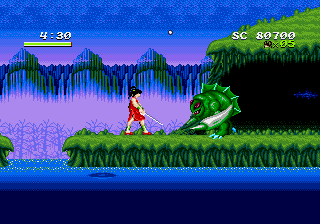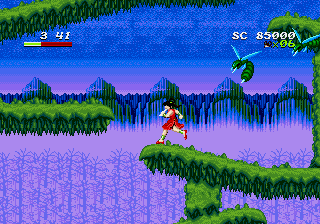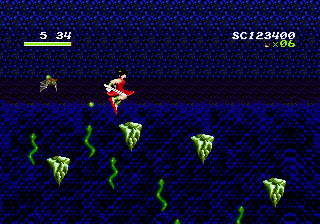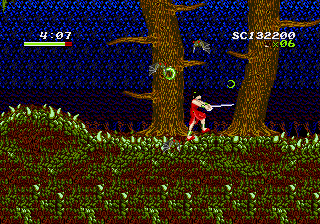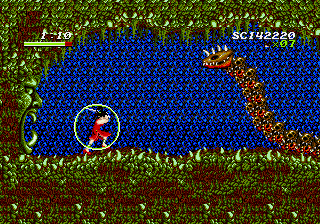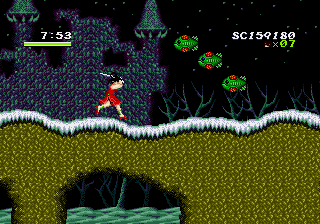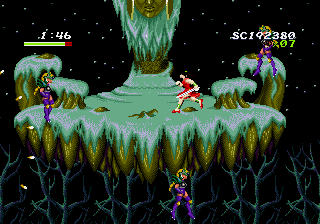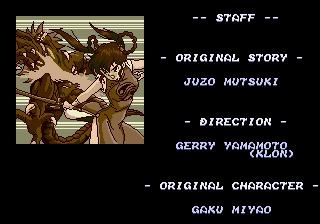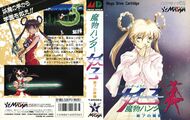Mamono Hunter Youko: Dai 7 no Keishou
From Sega Retro
| Mamono Hunter Youko: Dai 7 no Keishou | |||||||||||||||
|---|---|---|---|---|---|---|---|---|---|---|---|---|---|---|---|
| System(s): Sega Mega Drive | |||||||||||||||
| Publisher: Masaya | |||||||||||||||
| Developer: KLON | |||||||||||||||
| Licensor: Madhouse, Toho Extreme | |||||||||||||||
| Genre: Action[1][2] | |||||||||||||||
| Number of players: 1 | |||||||||||||||
|
Mamono Hunter Youko: Dai 7 no Keishou (魔物ハンター妖子 第7の警鐘) is a Sega Mega Drive action platform game developed by KLON and published by Masaya. Based on the 1990 anime series Mamono Hunter Youko, it was released exclusively in Japan in March 1991.[2]
Contents
Story
Youko Mano (真野 妖子) is a ordinary high school girl until she learns that every woman in her family is a devil hunter who must defend our world from the denizens of the demon world. When the two worlds are in alignment, a portal opens that can allow the demons to cross over. Youko must battle the demons, led by the demon queen Feriam (フェリアム), and take her place as the 108th generation devil hunter.
Gameplay
The game is a side-scrolling platform game, similar to the Valis series, played as the heroine Youko, a 16-year-old girl with a sword tasked with banishing demons from the human world. Youko moves with ![]() and
and ![]() and crouches with
and crouches with ![]() . She jumps with
. She jumps with ![]() or
or ![]() ; unlike many platformers, she cannot change her direction in the middle of a jump. She swings her sword with
; unlike many platformers, she cannot change her direction in the middle of a jump. She swings her sword with ![]() . She can attack with her sword while standing, jumping, or crouching, and she can stab downward in midair with
. She can attack with her sword while standing, jumping, or crouching, and she can stab downward in midair with ![]() +
+![]() .
.
Her sword can generate a barrier around her by holding ![]() . She keeps the barrier for as long as
. She keeps the barrier for as long as ![]() is held and can move (but not attack with her sword) while she has the barrier. The barrier dissipates after a moment when
is held and can move (but not attack with her sword) while she has the barrier. The barrier dissipates after a moment when ![]() is released. Youko can throw the barrier at enemies as a projectile by releasing
is released. Youko can throw the barrier at enemies as a projectile by releasing ![]() and then pressing
and then pressing ![]() again before the barrier dissipates. The barrier is usually thrown directly forward, but it can be directed diagonally upward or downward with
again before the barrier dissipates. The barrier is usually thrown directly forward, but it can be directed diagonally upward or downward with ![]() +
+![]() or
or ![]() +
+![]() . Both the barrier and the sword attack can neutralize enemy projectiles. The barrier returns to Youko like a boomerang after it reaches the apex of its travel, and she can retain it by holding
. Both the barrier and the sword attack can neutralize enemy projectiles. The barrier returns to Youko like a boomerang after it reaches the apex of its travel, and she can retain it by holding ![]() again.
again.
Youko has a health bar that drops when she receives damage, then partially regenerates if she does not immediately take additional damage. Otherwise, if she is hit before replenishing her health, she takes loses the ability to replenish the damage from the first attack. Youko's barrier protects against small projectiles but not against larger projectiles or direct contact with an enemy (unless fired as a projectile). Multiple successive small projectiles can also penetrate the barrier. She loses a life if she loses all of her health or if the time limit runs out and restarts from a predetermined checkpoint in the level. She also loses a life from falling into a bottomless pit or deep water. The game ends if she loses all of her lives, but it can be continued from the beginning of the level if the player has credits left.
Items
| Gradually replenishes Youko's health bar to full (but it can be interrupted by taking damage). | |
| Gives the player an extra life. There is one hidden in every level. |
Scenes
| 沼と植物の世界だ! | |
|---|---|
| 均熱の溶岩地帯! | |
| 美しい水のステージ | |
| 荒れはてた洞くつを行く | |
| 幽幻な雪の世界だ! | |
Production credits
- Original Story: Juzo Mutsuki
- Direction: Gerry Yamamoto (KLON)
- Original Character: Gaku Miyao
- Game System: AAA (KLON)
- Graphic Arts: Yuko Tanisako (KLON)
- Illustration: Gaku Miyao
- Dot Work: Yuko Tanisako (KLON), Kaoru Nagata (KLON)
- Map Design: Kiyoshi Sakai (KLON)
- Music: Keiichi Yamamoto
- Music Operation: Kayoko Maeda (KLON), Atuhiro Motoyama (KLON)
- Sound Effect: Kayoko Maeda (KLON)
- Program: Kiyoshi Sakai (KLON)
- Producer: Keiichi Onogi
- Assistant Producer: Keisuke Yasaka
- Sales Promoter: Yasuaki Yokoe, Jun Mimura
- Thanks to: Toho, Mad House, Sinichi Ito
- Presented by: NCS corp.
Magazine articles
- Main article: Mamono Hunter Youko: Dai 7 no Keishou/Magazine articles.
Promotional material
also published in:
- Mega Drive Fan (JP) #12: "January 1991" (1990-12-08)[6]
also published in:
- Mega Drive Fan (JP) #13: "February 1991" (1991-01-08)[7]
also published in:
- Mega Drive Fan (JP) #14: "March 1991" (1991-02-08)[8]
also published in:
- Mega Drive Fan (JP) #15: "April 1991" (1991-03-08)[9]
Physical scans
| Sega Retro Average | |||||||||||||||||||||||||||||||||||||||||||||||||||||||||||
|---|---|---|---|---|---|---|---|---|---|---|---|---|---|---|---|---|---|---|---|---|---|---|---|---|---|---|---|---|---|---|---|---|---|---|---|---|---|---|---|---|---|---|---|---|---|---|---|---|---|---|---|---|---|---|---|---|---|---|---|
|
| 60 | |
|---|---|
| Based on 11 reviews | |
Technical information
- Main article: Mamono Hunter Youko: Dai 7 no Keishou/Technical information.
External links
- Sega of Japan Project Egg pages: Mega Drive
References
- ↑ 1.0 1.1 File:MHYD7nK MD JP Box.jpg
- ↑ 2.0 2.1 2.2 https://sega.jp/history/hard/megadrive/software_l.html (Wayback Machine: 2020-07-02 23:21)
- ↑ Beep! MegaDrive, "November 1990" (JP; 1990-10-XX), page 15
- ↑ https://www.amusement-center.com/project/egg/game/?product_id=1456
- ↑ File:Mamono Hunter Youko MD credits.pdf
- ↑ Mega Drive Fan, "January 1991" (JP; 1990-12-08), page 96
- ↑ Mega Drive Fan, "February 1991" (JP; 1991-01-08), page 85
- ↑ Mega Drive Fan, "March 1991" (JP; 1991-02-08), page 38
- ↑ Mega Drive Fan, "April 1991" (JP; 1991-03-08), page 88
- ↑ Aktueller Software Markt, "Juli 1991" (DE; 1991-06-28), page 114
- ↑ Beep! MegaDrive, "April 1991" (JP; 1991-03-08), page 28
- ↑ Console XS, "June/July 1992" (UK; 1992-04-23), page 132
- ↑ Famitsu, "" (JP; 1991-0x-xx), page 1
- ↑ Hippon Super, "April 1991" (JP; 1991-03-04), page 41
- ↑ Joystick, "Mai 1991" (FR; 1991-0x-xx), page 142
- ↑ Mega Drive Fan, "June 1991" (JP; 1991-05-08), page 91
- ↑ Power Play, "7/91" (DE; 1991-06-12), page 126
- ↑ Sega Pro, "February 1992" (UK; 1992-01-16), page 19
- ↑ Sega Pro, "April 1993" (UK; 1993-03-11), page 66
- ↑ Sega Saturn Magazine, "September 1995" (JP; 1995-08-08), page 87
| Mamono Hunter Youko: Dai 7 no Keishou | |
|---|---|
|
Main page | Magazine articles | Reception | Region coding | Technical information | Bootlegs | |
